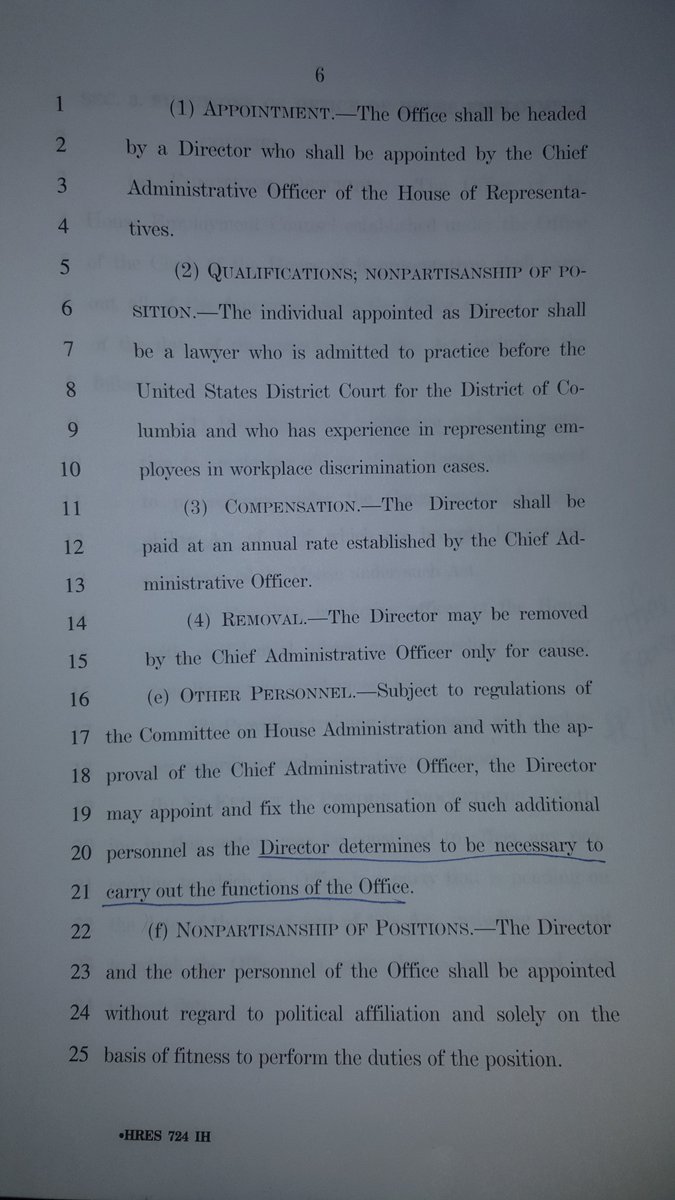...want to see what's in it?
I'll only have time to read one tonight, so let's do H. Res. 724
#ReadtheBill #mepolitics #ME02 #Bond2018 #TWPSB
I'll only have time to read one tonight, so let's do H. Res. 724
#ReadtheBill #mepolitics #ME02 #Bond2018 #TWPSB
External Tweet loading...
If nothing shows, it may have been deleted
by @RepPoliquin view original on Twitter
Disclaimer, I do not work in employment law. Were I actually voting on this bill, I would phone a friend(s) to make sure I am not missing anything. First page is nothing sensational - title, sponsors, etc. 

P. 2 - There are a lot of references throughout that reference the Congressional Accountability Act of 1995, without appropriate citations or specificity. A bit sloppy to me. A good use of staff is looking up references for efficient bill reading, it shouldn't take this long. 

Seems to be a requirement to adopt an anti-harassment/discrimination policy, but not any *specific* policy. This does not establish actual regulations, which can be like footnotes where the good stuff is, which must (should) be done by 6/1/18. This bill establishes a new office.
P. 3 - talks about who is covered by incompletely referencing a 40 page document. Establishes oversight capacities like the ability to force testimony and establishes that there will be representation for the "covered employees" 

P. 4 - more types of proceedings covered. There is supposed to be a hotline, we'll presume the regulations will cover that. There is a clause that might create bar issues, but that's not going to matter to most of you reading. 

P. 5 - creates attorney/client privilege relationship, states that attorneys fees cannot be sought (which actually might have been a great way to at least partially fund this office without controversy), carve out for civil actions. I have *NOT* read the CAA 1995. 

It's 40 pages and the version I grabbed doesn't reference section 408. I tried to find a different version, but got 2 corrupted PDFs from different government websites. 🤔🤨🤬
I'm not playing go fish for another version tonight.
I'm not playing go fish for another version tonight.
It appears that if you flip over to civil court for recourse you are on your own. I don't know the reason for that, it's probably buried in some regulations somewhere or one of the corrupted PDFs. My gut says I would want there to be an option for representation in civil court.
Government employees are not that well-paid for the costs of living in DC and that type of attorney is $$$. However, I freely acknowledge there may be a structural barrier of some sort to thoroughly obliterate my gut reasoning. Again, not an employment law junkie.
P. 6-8 set up the staff, compensation, office space, job functions, no representation for actions in progress (which sucks, wouldn't you want to protect those claims - it shouldn't be that many, right? RIGHT?), and info on hiring...not a thing on how this is paid for. 





P. 9 - adds sexual harassment as a protection against firing, then leads into sexual relationships with staff members...which is probably a good idea, but you all have seen political dramas/comedies, right? I feel like this isn't a super practical stance. 

P. 10/11 - you can still have sexual relations if you are married to your staffer. So nepotism = yes, sex in general = no. I feel like there is something interesting in Sec. 7, but I don't know employment law well enough to put my finger on it. This would be a phone a friend. 





Overall, I would probably vote FOR this bill contingent on the following:
1. Answering outstanding questions
2. WAY better references
3. Some idea how it would be paid for and that it isn't merely symbolic
4. It should give legal counsel to pending actions...& how many are there?
1. Answering outstanding questions
2. WAY better references
3. Some idea how it would be paid for and that it isn't merely symbolic
4. It should give legal counsel to pending actions...& how many are there?
When you are voting for your federal delegation, no matter where you are, make sure that the person you cast your vote for can provide analysis of bills. It's probably not needed on each one, but they should be able to explain on request if not published. #mepolitics #ME02
You should be able to get the following information:
1. How did you/will you vote
2. Why will you vote that way
3. What compromises did you make and why
4. Did you have any unanswered questions
1. How did you/will you vote
2. Why will you vote that way
3. What compromises did you make and why
4. Did you have any unanswered questions
• • •
Missing some Tweet in this thread? You can try to
force a refresh












